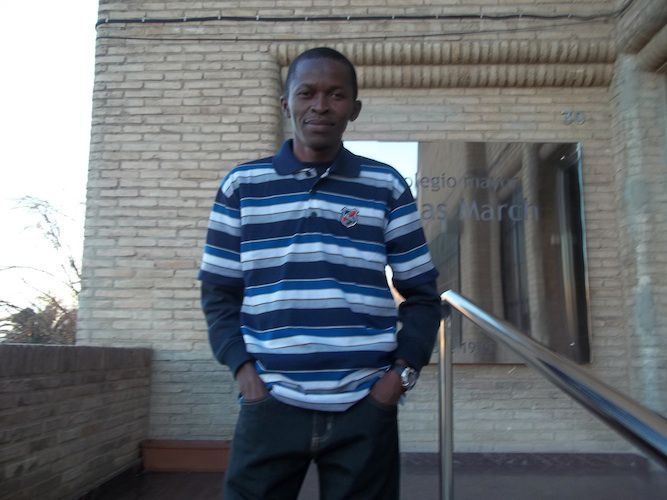The CEU Cardenal Herrera University interviews one of its students, Lussamuel Elidieu, who carried out a Master´s Degree in Teacher Training for Secondary School Education, Vocational training and training to teach languages

Lussamuel Elidieu is from Haiti and attended the University CEU Cardenal Herrera, Valencia, where he completed his Master´s Degree in Teacher Training for Secondary School Education, Vocational Training and training to teach languages. His was able to study in Valencia thanks to the grants scheme that was created by the CRUE. The CEU-UCH supported the scheme, offering two of the grants awarded by Spanish universities. A few months after completing his training in Spain, Lussamuel tells us about being back in Haiti, what he believes the future holds for himself and for his country and the memories of his time at the CEU-UCH and at the Colegio San Pablo CEU.
What was the highlight of your time in Valencia? And what was the most difficult part?
There were many positive aspects about my time in Valencia, but the best thing for me was the people, because they have a very welcoming and generous nature and they treated me just like any other student in the classes, so I never felt different. I was also able to understand the classes even though my first language is French. The ´Christitan Life´ Church, whose Minister is called Juan Jose and his wife Ana, also made me feel at home.
The work experience I carried out at the San Pablo CEU College of Moncada was an unforgettable experience. Besides learning a lot about Spanish culture, I learned to use the interview technique with students from the first to the third year of the ESO. I was also very happy to teach the students in French to the fourth year students of the ESO and also to the first and second year A-level students.
I´ve now got a lot of things I can say to help people who have never travelled to Spain. The worst bit about arriving in Valencia was when I got a map of the city so I could go wherever I wanted, because my weakness is geography!
In what way has the training you received at the Cardenal Herrera University helped you?
Training in the CEU has helped me to get in depth knowledge about teaching languages, particularly about teaching English. I also learnt research and evaluation techniques and I can speak a new language, Spanish. I also now know the Spanish educational system. My goal with these studies is to teach in schools in Haiti and contribute to the development my country.
What do you dedicate yourself to now? What is your daily routine in Haiti?
I haven´t been able to find a job yet because Haiti is a strange country that doesn´t offer young people many opportunities to enter into employment, and help build the future of the country. In Haiti, when head teachers see the C.V.s of the most qualified people they automatically think they have no way of finding the money to pay these professionals. Despite this, these professionals are willing to contribute to the development of their country, but are unable to put their skills into practice as the government does not seem to have the desire to make use of them in the smooth running and development of the country, or perhaps it is because it cannot do so.
Still, my day to day life in Haiti is good because I’m with a group of professionals from various professions; doctors, teachers, agronomists, etc…, who belong to an organization that believes in development. So we are working hard for our region, but one day we hope the work of this organization can reach the rest of the country. The name of the organization is ODIBA: Organization for the Comprehensive Development of Bayonnais, which is the region where I was born in Haiti.
Do you think that scholarships like the one you received can help the future of your country?
I cannot thank the CRUE and the CEU Cardenal Herrera University enough, in particular, for the opportunity they gave me. I would have loved to complete the Masters, because it started in October and I could not reach Spain until January, due to a delay in the transfer of my records. I only need 24 CEU credits in order to have the full diploma, because I’ve already written the final draft. With this I could find a good job at the University of Haiti, because it accepts the full Master’s Degree at this academic level.
So, I believe that in the same way that this scholarship helped me, it can also do a lot for the future of my country. Haiti is a small country that experienced a large earthquake, qualified professionals died due to this tragedy and there are not that many in this country. I hope I can find a school where I am able to teach Haitian students and provide them with all the knowledge I gained at the Cardenal Herrera University.






